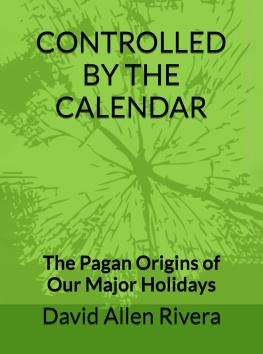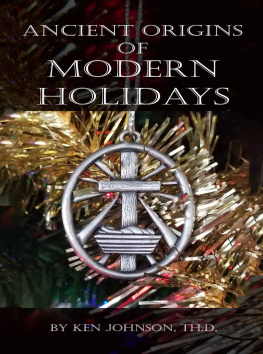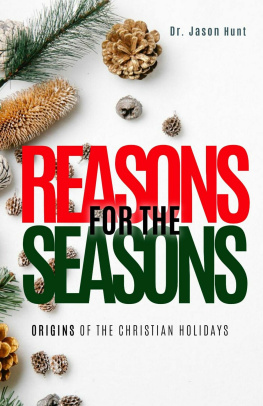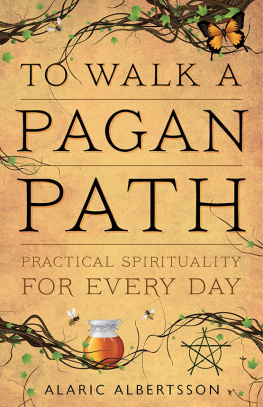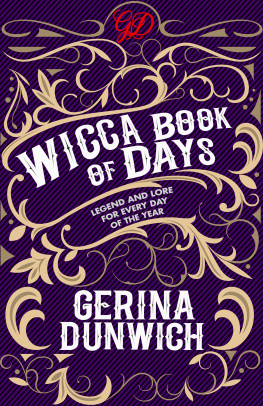David Allen Rivera - Controlled by the Calendar - The Pagan Origins of our Major Holidays
Here you can read online David Allen Rivera - Controlled by the Calendar - The Pagan Origins of our Major Holidays full text of the book (entire story) in english for free. Download pdf and epub, get meaning, cover and reviews about this ebook. year: 2019, publisher: Independently published, genre: Religion. Description of the work, (preface) as well as reviews are available. Best literature library LitArk.com created for fans of good reading and offers a wide selection of genres:
Romance novel
Science fiction
Adventure
Detective
Science
History
Home and family
Prose
Art
Politics
Computer
Non-fiction
Religion
Business
Children
Humor
Choose a favorite category and find really read worthwhile books. Enjoy immersion in the world of imagination, feel the emotions of the characters or learn something new for yourself, make an fascinating discovery.
- Book:Controlled by the Calendar - The Pagan Origins of our Major Holidays
- Author:
- Publisher:Independently published
- Genre:
- Year:2019
- Rating:5 / 5
- Favourites:Add to favourites
- Your mark:
- 100
- 1
- 2
- 3
- 4
- 5
Controlled by the Calendar - The Pagan Origins of our Major Holidays: summary, description and annotation
We offer to read an annotation, description, summary or preface (depends on what the author of the book "Controlled by the Calendar - The Pagan Origins of our Major Holidays" wrote himself). If you haven't found the necessary information about the book — write in the comments, we will try to find it.
Controlled by the Calendar - The Pagan Origins of our Major Holidays — read online for free the complete book (whole text) full work
Below is the text of the book, divided by pages. System saving the place of the last page read, allows you to conveniently read the book "Controlled by the Calendar - The Pagan Origins of our Major Holidays" online for free, without having to search again every time where you left off. Put a bookmark, and you can go to the page where you finished reading at any time.
Font size:
Interval:
Bookmark:
CONTROLLED BY THE
CALENDAR
THE PAGAN ORIGINS OF OUR
MAJOR HOLIDAYS
Written by David Allen Rivera
The definitive book on the pagan origins of our major holidays, and
how the observance of them may be robbing you of spiritual fulfilment
Copyright 1997 by David Allen Rivera
Library of Congress Catalogue Card Number: 97-92258
All Scripture quotations are from the Authorized King James Version of the Holy Bible
CONTENTS
CHAPTER ONE
How It All Started
Pagan Names for the Months of the Year
Pagan Names for the Days of the Week
Constantine and the Roman Catholic Influence
The Facts About Sunday
The Pagan Influences on Christianity
CHAPTER TWO
Valentine's Day: Is it a Christian Observance or a Pagan Celebration?
CHAPTER THREE
Easter: What do Bunnies and Eggs Have to do With Jesus?
Rethinking Easter
When Did These Things Actually Happen
The Pagan Origins of Easter
The Traditions of Easter:
Easter Eggs
The Rabbit
Lent
Easter Sunrise Worship
Easter Candles
Easter Ham
The Easter Lily
Hot Cross Buns
Easter Clothing
What You Can Do
CHAPTER FOUR
Halloween: Halloween Unmasked
Halloween Gets its Foot in The Door
The Druids
Witchcraft
Halloween Becomes a Church Observance
The Traditions of Halloween
The Dangers of Halloween
Dealing with Halloween
CHAPTER FIVE
Christmas: Christmas Unwrapped
It's Not Cool to Yule
The Birth of Jesus
The Wise Men
Looking at The Other Evidence
Hebrew Calendar
The Jewish Feast Days
Saturnalia
The Facts About Bethlehem
The Truth About the Christmas Tree
The Origin of Santa Claus
The Holiday of Christmas
To Yule or Not to Yule
CHAPTER SIX
Conclusion
CHAPTER ONE
HOW IT ALL STARTED
The picture is indelibly etched in our minds. As Moses cowers on top of Mount Sinai, the voice of God commands: "Thou shalt have no other gods before me." As he looks skyward, the finger of God burns the words of the Law on the tablets of stone the Ten Commandments. I am, of course, referring to the 1956 American film classic starring Charlton Heston, which is my favourite movie . I mention it here, because it serves to illustrate the point I would like to make, which in turn will establish the basis for the underlying theme of this book God's hatred of idolatry and paganism. Remember, it was the first commandment (Exodus 20:3), and because of that, one can assume that it was the issue most important to him.
When God revealed to Moses the final plague upon Egypt, which would prove to be the coup-de- grace, he went out of his way to address what seemed to be harmless inanimate objects (Exodus 12:12): "For I will pass through the land of Egypt this night, and will smite all the firstborn in the land of Egypt, both man and beast; and against all the gods of Egypt I will execute judgment: I am the Lord." God would later command that man was not to make any "graven image, or any likeness," "gods of silver," or "gods of gold" (Exodus 20:4, 23); and he further commanded that man was not to "bow down" or "serve them." The given reason (Exodus 20:5) " ...for I the Lord thy God am a jealous God." In Exodus 23:13, he even forbid the "mention of the name of other gods..."
Exodus 22:20 mandated the punishment for anyone caught sacrificing to a false god. They were to be "utterly destroyed." This was not just a threat, or an exaggeration. After being on the mountain forty days and receiving God's law, Moses was ordered to return to the camp because Israel had made a golden calf to worship. To say that Moses was upset, would be putting it mildly. The idol was melted down into a form that could be ground into a powder-like consistency, which was then put into water. The children of Israel were made to drink it (Exodus 32:20). On top of that, Moses demanded to know who was "on the Lord's side." Those not expressing their allegiance to God, about 3,000 men, were killed (Exodus 32:27- 28).
How can it be that the all-powerful creator of all living things was jealous of a lifeless representation of a false, non-existent deity? We are given a clue in Exodus 23:33 "...for if thou serve their gods, it will surely be a snare unto thee." There is an implication of deceit here. But, a deception by who? Ironically, the apostle Paul referred to the "snare of the devil" (1 Timothy 3:7, 2 Timothy 2:26), and therein lies the answer.
It seems that the nation of Israel found it difficult to trust and worship a God they could not see, and this certainly was a contributing factor to their periods of falling back into idolatry. The fabrication of an idol enabled them to have something they could look to. So, to counteract their lack of faith, Moses built the Ark of the Covenant, and it became a symbol of the divine presence of God. We, as Christians, know that the idols of Biblical times, as well as the gods who represent various religions today, do not exist, and are in fact a manifestation of Satan, who has deceived its practitioners into believing that they do.
So you see, just as a father would shelter and protect his children, God was doing the same to the children of Israel. Knowing that Satan would try to trick people into worshipping him, God sought to prevent it by totally banning every aspect of idol worship, which included even the mere mention of their names. In this way, there would be no possibility of Satanic influence. Certainly Paul knew of God's intention, when he wrote in 2 Corinthians 2:11 "Lest Satan should get an advantage of us: for we are not ignorant of his devices." His advice is just as good now, as it was then (1 Thessalonians 5:22): "Abstain from all appearance of evil."
Once you understand why God has an intense hatred of idolatry, it is all the more incredible how we have allowed ourselves to be subjected to a calendar that is a testament to the overwhelming influence of false gods in our society. To begin with, all you need to do is to look at the basis for the names of some of the months, as well as for the days of the week. Our calendar actually honours false gods, in fact, when I learned these things in grade school, it caused me to get interested in Greek mythology. So in church, you learn about God; in school, you learn about false gods. I guess that is why there has to be a separation of church and state.
PAGAN NAMES FOR THE MONTHS OF THE YEAR
January: From the Latin Januarius, this month is named after the two-faced Roman God Janus who was able to look back at the past, as well as into the future. One of the major gods of Roman mythology, Janus was initially known as the god of light and day, but later was recognized as the "god of the beginning of things." His help was solicited before important events. He was worshipped as the guardian of shipping and trade, and is sometimes said to be the masculine form of the goddess Diana. The beginning of the year was considered sacred, and a festival in his honour, Agonia, was held on January 9th. The Romans offered sacrifices to Janus , and in a tradition dating back to 747 BC, exchanged gifts with friends and family. The presents were called Strenae, named after Strenia, the goddess of strength. Christian emperors continued the new year tradition, but the pagan rituals became so widespread that the Church tried to prevent its observance through their method of substitution. A Jewish custom, based on the Gospel of St. Luke, said that Jesus was circumcised when he was eight days old. So, in 487, the date of his birth was set at December 25 th, and the Church began celebrating the Feast of the Circumcision on January 1st, to observe the anniversary of the event.
Next pageFont size:
Interval:
Bookmark:
Similar books «Controlled by the Calendar - The Pagan Origins of our Major Holidays»
Look at similar books to Controlled by the Calendar - The Pagan Origins of our Major Holidays. We have selected literature similar in name and meaning in the hope of providing readers with more options to find new, interesting, not yet read works.
Discussion, reviews of the book Controlled by the Calendar - The Pagan Origins of our Major Holidays and just readers' own opinions. Leave your comments, write what you think about the work, its meaning or the main characters. Specify what exactly you liked and what you didn't like, and why you think so.

